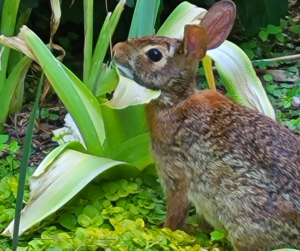
I have growing sympathy for Mr. McGregor.
McGregor, you may remember, is the mean old man who chases Peter Rabbit out of the garden. If I remember correctly (unlike Winnie the Pooh and Wind in the Willows, Peter Rabbit is not a book one tends to read as an adult), Mr. McGregor — shotgun in hand — takes a potshot at Peter. When you’re a little kid, Mr. McGregor is scary and the embodiment of all things bad.
But now I’m an old man (though I hope not too mean a one).
Living overseas, given our itinerant lifestyle, Brenda and I never owned a home. We bought our first house in Raleigh, North Carolina, six years ago, when we were in our late sixties. Having spent years working with subsistence farmers on projects involving sustainable agriculture (but more on the community organization and legal rights end than on the agricultural part per se), we opted to turn the small, bedraggled lawn of our new home into a sustainable native plant garden. A garden to attract birds, butterflies, and bees.
The only garden we’d had before was in the little dusty town of Caseara, in the eastern Amazon, when we were Franciscan lay missioners. That garden was a necessity if we wanted fresh vegetables – we grew mustard greens, radishes, eggplant, and tomatoes. But the red ants, blaring hot sun, and occasional snakes made gardening anything but a pleasure. One got into and out of the garden as fast as one could.
North Carolina is another matter. As we labored lovingly, identifying native plants, placing them, watching them grow (or, in some cases, not grow), replanting, we came closer to God. Brenda has a wonderful gardening book – Backyard Parables – that teaches us, among other things, that only the novice gardener thinks she can control her garden. Our garden provides material for hundreds of homilies – Jesus loved to speak in terms of seeds and plants.
So we grow closer to God, to His slow, organic way of being, to the intricate intertwining of plants and insects and animals, to His patience. But then…birds, butterflies, bees, and, as it turns out — bunnies. We have always had a few, but this year there are bunnies in abundance. Cute little guys with bright eyes, glowing fur, long soft ears—hopping around and eating—wait a minute: eating our plants!
Tulips gone, primroses eaten. The new tiny rose bush (roses are one exception to the native plant rule) bursting out with its first, beautifully formed yellow flower. In the morning, we find the decapitated blossom lying by the side of the plant.
“The baby rabbits,” our neighbor says. “They are always trying new things — if they don’t like them, they simply leave them there.”
Grr!
One morning my wife finds her jasmine vine, which she has been patiently training up a trellis, cut off and chewed just above the ground – killing the whole vine, of course. That morning, had I owned a shotgun, Peter would have been in for it.
But time brings reflection. They neither sew nor spin, Christ said of the lilies of the field, and certainly, that extends not only to the sparrows but to bunnies. They, too, are part of God’s creation (as, I suppose, are fire ants and snakes – though God didn’t consult me on those).
In this world, there will always be a tension between those who labor to create and maintain and those who do not. The Little Red Hen and her cohorts. Martha and Mary (I admit to having always sympathized with Martha). That, too, is part of God’s plan.
So the bunnies continue—surprisingly bold when we try to shoo them from the garden. Apparently, knowing that our bark is worse than our bite—reminds us daily of how God, chuckling, likes to put a little contrariness into our life.
Copyright Arthur Powers, 2022